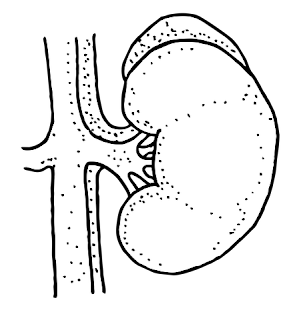13 important symptoms that indicate that the kidneys are about to fail
Kidney failure occurs when the kidney no longer works because the person's body cannot produce enough of the hormone that controls the waste disposal of the body.
Kidney failure affects more than 100 million people worldwide. It is one of the most devastating diseases of the 21st century, claiming 30,000 lives every year. However, the lack of proper treatment and the timely diagnosis of kidney failure is among the factors fuelling the mortality rate.
Kidney failure happens to an average of 2,500 people a day in the United States, with the vast majority of deaths occurring in adults older than 60. Up to 30 percent of kidney failure may be due to small infections that cannot be recognized, according to the National Kidney Foundation.
World Kidney Day was observed recently in the world to create awareness about kidney damage factors, kidney related diseases and ways to keep it healthy, as kidney diseases are spreading very fast in Pakistan.
Therefore, in this article, we will mention the symptoms that appear on the body that ring the alarm bells in case of kidney failure and if they are not heeded, then a big problem can arise.
The kidneys perform very important functions in the human body, including cleaning the blood of waste products and removing these toxins from the body. but if the kidneys are not doing their job properly, then these extra substances start to accumulate in the blood and start harming the health.
Kidney failure is considered to be inevitable for anyone who is older than 75. All that is required is that your kidney functions below 20%.
How to spot symptoms of kidney disease
Majority of people ignore the symptoms of kidney failure and by the time they know that the kidneys are about to fail, it is too late, so if any of the following symptoms appear Contact your doctor immediately. The following are the top symptoms that appear in case of kidney failure.
Frequent nausea
Nausea and vomiting
Loss of appetite
Being surrounded by fatigue and lethargy
Lack of sleep
Frequent urination
Having difficulty concentrating
Muscle aches
Inflammation of the feet and ankles
Dry skin and allergic reactions
High blood pressure
Having trouble breathing
Chest pain
Symptoms of kidney disease can also be caused by another disease. So the appearance of these symptoms does not mean that if someone is showing these symptoms, he has a kidney problem. It may also be a symptom of any other disorder.
Consult a doctor first for correct information about this. Kidney disease occurs when a disease disrupts the functioning of the kidneys, and if this disruption is ignored for a long time, then the kidneys begin to deteriorate. There can be many reasons for developing kidney disease, among which the following are the most important.
Developing type 1 or type 2 diabetes
High blood pressure
Polycystic kidney disease
Hereditary kidney disease
Enlargement of the bladder
Kidney stone formation
Inflammation of the kidney
Inflammation of kidney vessels and its surroundings
Urinary retention disease
Kidney infection etc
Apart from the convenience in our lifestyle and poor diet, there are some factors that increase the risk of developing kidney disease. Heart diseases are also very damaging to the kidneys, along with smoking, excessive alcohol consumption, drug use and obesity.
When should you see a doctor?
According to experts, if the symptoms of kidney failure are appearing on the body, then you should not delay and immediately contact your doctor to find out what is the real cause of these symptoms, because if the kidney disease is recognized at the beginning.
If it is treated, a person is saved from great suffering and ignoring these symptoms for a long time leads to ruining the health of not only the kidneys but the whole body.









0 Comments